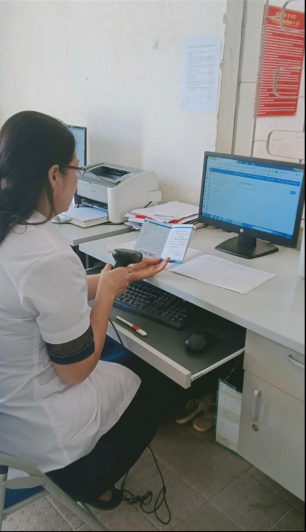Vietnam National Immunization Information System at the grassroots level of the commune health center
Eschewing the proper ten-finger typing style, her two pointed fingers darted over the keyboard like a woodpecker. It was quite amazing watching her operate the computer in her own nonconventional way—yet still, she was pretty efficient. The electronic immunization registry (EIR) didn't seem to pose much of a challenge to Mrs. Do Thi Phai, who has been working at Phieng Khoai Commune Health Center (CHC) for the past 30 years, 17 of those as an immunization officer.
This remote CHC nests in between the mountains of Yen Chau District, Son La Province, in the northern part of Vietnam. Phieng Khoai CHC serves the largest commune in Yen Chau District, which has a population of more than 11,000, with over 1,000 children under 5, and a birth cohort of more than 200 a year. The district's diverse ethnic backgrounds include Kinh (Vietnamese majority), Thai, H'mong, and Xinh Mun. The population spreads over 9,200 square kilometers of hard-to-reach mountainous area, with a 21-kilometer border with Laos, which only complicates the population management.
Under the National Expanded Program on Immunization (NEPI), all children in Vietnam should be fully immunized. This goal has been seemingly unattainable for areas like Phieng Khoai commune with barriers in access and transportation; low population awareness in immunization, especially in ethnic minorities; and a shortage of health care workers, with a high rollover rate. Children's vaccination occurs only once a month at the CHC and outreach vaccination to some of the most remote villages. Those monthly scheduled immunization days were a nightmare for the immunization officers, who had a mountain load of work to plan and prepare vaccines and invitations for smooth execution of immunization day, and then another mountain load of work to report those vaccination and vaccines afterward.Since the implementation of the National Immunization Information System (NIIS) nationwide in 2017, Mrs. Do's job has changed drastically. There were much resistance and many challenges at the beginning, she said. Lack of computer skills, misunderstanding of the system, and fear of change were some of the main reasons. Furthermore, the immunization and children/population database in the system was a blank page at first; thus, these immunization officers were also tasked with the burden of data input of all the children born from January 1, 2015, and their vaccination records to create the foundation for a functional system. But with high determination and support from the district, provincial, and national levels, Mrs. Do attended many training sessions and received guidance from supportive supervision visits. Now, Mrs. Do is more confident not only with the NIIS but also with computers in general.
The Introducing Digital immunization Exchange And Learning from Vietnam (IDEAL Vietnam) project, funded by the Bill & Melinda Gates Foundation, has been supporting the transition of the Vietnamese immunization program, utilizing NIIS, to the completely paperless system in two project provinces of Son La and Hanoi since 2018, with a vision to scale up nationwide. In the successful transition, immunization officers, like Mrs. Do, in the two project provinces would be equipped with tools and guidelines to not only input data into the system, but also improve the ability to ensure data quality and utilize these data for meaningful functions and enhance the quality of their important work.
The two days they spend prepping for immunization day by searching through piles of papers and logbooks to consolidate the list of children and vaccines needed would turn into half an hour extracting and printing from the NIIS. With the four-step procedure to cross-check, input, and update data right on immunization day, immunization officers would then be able to generate electronic immunization and vaccine reports right on the system to the district and provincial levels within half an hour, eliminating completely the paper report. IDEAL Vietnam has been working closely and directly with immunization officers from the grassroots level in the CHCs to the national level of NEPI as well as with Viettel, the technical partner developing the NIIS, to address user concerns, improve the system, and comply with any updates in the health system and immunization regulations.
Mrs. Do Thi Phai, though reaching her retiring age, is an eager pioneer and a full supporter of this new system. Talking about the initial daunting tasks of data input, she said she was serving the system, just like serving the people. Once the quality of input data from the grassroots level is ensured, the system's bugs are fixed, and the reports generated are accurate, immunization officers can then have the system serve them back, and Vietnam's vision of a fully functional NIIS that will hold the immunization records of every single citizen can be realized.
PATH is a global organization that works to accelerate health equity by bringing together public institutions, businesses, social enterprises, and investors to solve the world's most pressing health challenges. With expertise in science, health, economics, technology, advocacy, and dozens of other specialties, PATH develops and scales solutions—including vaccines, drugs, devices, diagnostics, and innovative approaches to strengthening health systems worldwide. Learn more: at www.path.org.
For more information as well as publications on IDEAL Vietnam, please visit our landing page at https://www.technet-21.org/en/topics/ideal.


